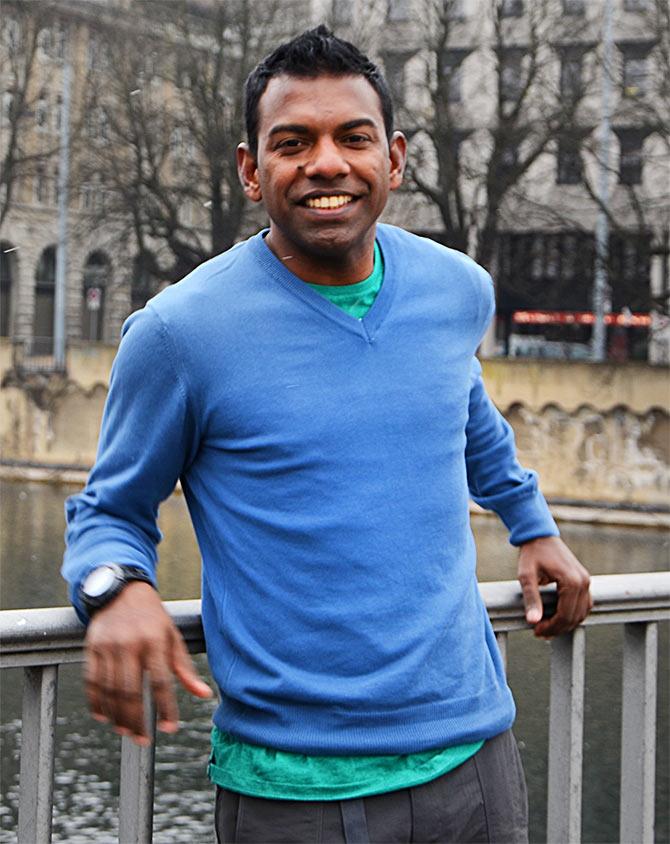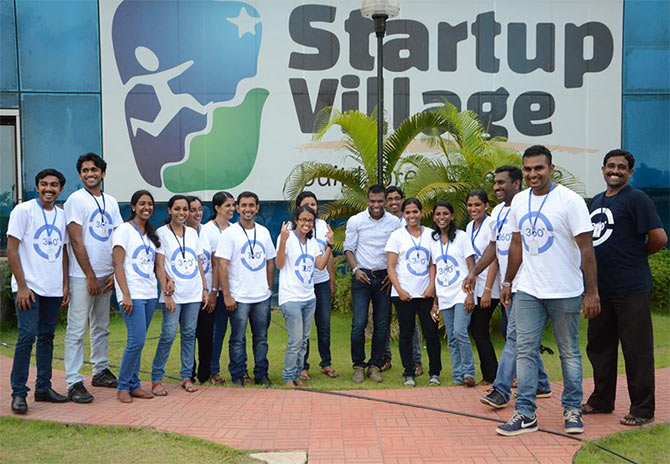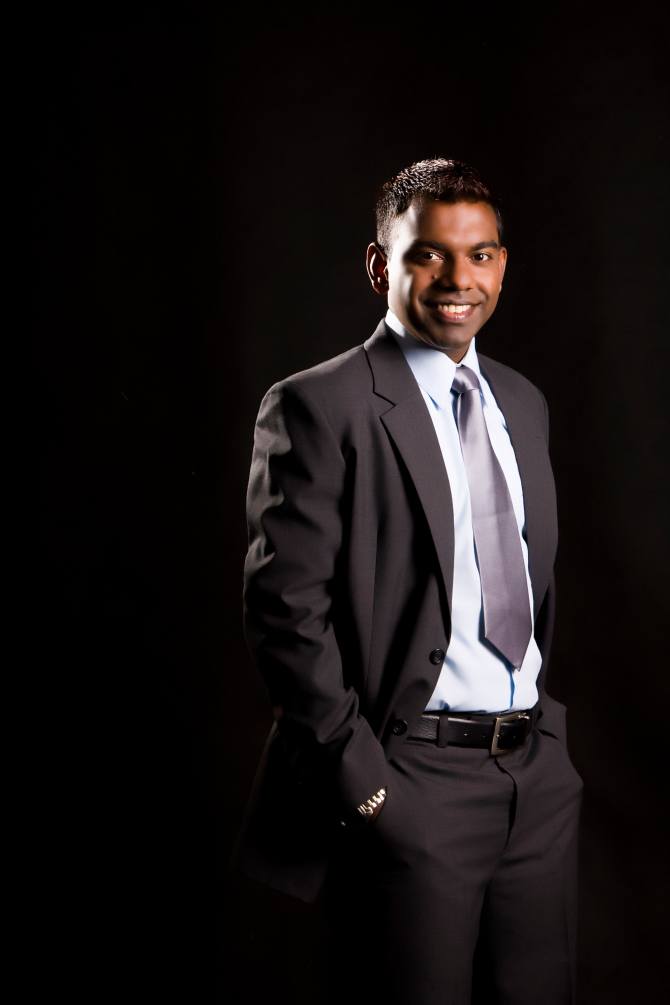 | « Back to article | Print this article |
Inspiring story of a poor farmer's son
He fought poverty.
He was teased for his funny 'Mallu' accent and eating habits. He fought 'racism'.
He sacrificed his football career for his family.
Today, Varun Chandran, from a small Kerala village, is the CEO of his own IT company and a dollar millionaire.
Remarkably, he has set up a part of his operations near the same small village he was born in.
If you were to ask me who my hero is, it's not Nehru or Mahatma Gandhi. It's I M Vijayan, the boy who, after having started out selling soda at stadiums and playing barefoot, went on to become the best football player in India. He was such an inspiration that I had his photo in my room, and used to pray to him before each game. He was my God!" says 34-year-old Varun Chandran.
Varun Chandran's own journey, from an impoverished home in a small village in Kerala, to a Silicon Valley millionaire, follows a like pattern.
As a small boy his ambition didn't go beyond chopping logs in the forests like his father, or following his uncle into the Army.
Varun was born in Paadam, a small village near Kollam. Most of the 800 families were poor landless labourers working in the nearby forest.
But the village owes its growth to Varun's maternal grandfather, Karam Velal Sadananthan, who moved there to farm tapioca. The pioneering spirit could thus be a family inheritance.
"My grandfather was a local hero -- a communist who got roads built and brought the first bus to the village. He even had an eatery where he served free food to people. This resulted in ever more people migrating to the village. He also fed the bus driver and conductor for free so that they were encouraged to come to the village," Varun recollects.
His grandmother was also a hardworking woman who tapped toddy in the jungle and sold it to the workers who worked in the forest.
"I saw a lot of hard working people in the village; they either worked in the paddy fields or in the forest. But most were illiterate. My father himself had two jobs -- he worked in the fields and also went to the jungle to chop logs."
His mother ran a grocery shop out of their home. A strong-willed, ambitious woman, she insisted that her children attend the English medium primary school in the next town.
"If it weren't for my mother, I don't think I would have gone to school, or bothered to study even if I had. She made sure that we were educated, unlike most of the rest of the village."
He still remembers studying under the light of a kerosene lamp as the village wasn't connected to the grid until he was 10 years old.
"In fact, I can't remember ever studying under an electric bulb. Even after we got electricity, power supply was intermittent and afflicted by voltage fluctuations. During the monsoon season we never had any power as the trees in the forest near our village invariably collapsed on to the electricity pylons."
Money was hard to come by. The grocery store was not doing well. Their indebtedness rose to the point that everything in their house was taken away, and they had to sleep on the floor.
"The school fee was Rs 25 a month but my parents couldn't pay the fees for six or seven months. I was thrown out of the class many times. I had to go through this humiliating experience many, many times in school."
Later, he was sent to a boarding school and life changed dramatically for Varun.
"At boarding school, there is a big difference between being a rich kid and a poor kid. You are humiliated by the hostel warden for paying the hostel fees late. Even as a teenager you realise how important a role money plays in our society. Looking back, my experience was truly disgusting.
"I also realised how skin colour plays a major role in who you are. There were teachers who called me 'the black boy'. It used to make me cry. That became my nickname in school. Some even called me a crow. It hurt me a lot and I hated it. I had more bad experiences than good ones in that school."
But he used football to channel all his anger. So inspired was Varun by the rags to riches story of I M Vijayan, the well known Malayali football player, that he wanted to be like him. "I saw myself in I M Vijayan," he says of his idol.
Please click NEXT to continue reading Varun's inspiring story
'I used to feel terrible about myself for not being able to speak English. After each failed attempt, I used to sit at the Sivaji Nagar bus stop and cry my heart out'
He soon became the school football captain and brought an inter-school trophy back to school. "That was my sweet revenge for all the insults and humiliations heaped upon me. Their attitude changed towards me after that, but it didn't matter to me any more. I continued to play football with all the pent up anger in me, like one possessed."
He won a government sports scholarship to enter a college in Trivandrum.
In the first year, he played for the Kerala state Under-16 football team in a tournament held in Uttar Pradesh. For the first time in his life, at the age of 16, he clambered aboard a train.
"That was my first step into the outside world, from a small village in Kerala to the northern part of India. It was an amazing trip to a place that was actually cold. Until then, I was merely a survivor. It was only when I went on that trip that I began to live my life."
From then on, progress was steady for Varun the footballer. He went on to captain the Kerala University football team. "I started making new friends, learning new languages and meeting people from different communities. These trips made me curious about different experiences, people and cultures."
His burning ambition was to play football for India and land a secure government job.
That was when he encountered another turning point in his life.
During his travels, he met one Abhoy Singh from Delhi who gave him his email id and asked him to stay in touch.
"I didn't know what an email was. I found out that it had something to do with computers."
He joined a private institute to learn about computers. "As a footballer, I had travelled all around India. But the Internet? It took me all around the world. New worlds opened in front of me."
Just as I M Vijayan had inspired him to become a footballer, Abhoy inspired him to learn computing, and become a programmer and an entrepreneur. "But neither of them knows the influence they have had on my life!" he says.
Just before finishing his college degree, Varun was picked to attend a selection camp for the next Santosh Trophy -- his opportunity to play for the Kerala senior side! But when at the camp, he injured his shoulder badly and had to leave.
He was back in his village, nursing his injury. But the situation at home was terrible; there was no food and an air of tension in the family.
"I had dropped out of college without a degree. After my injury, I wasn't a footballer either. My mother scolded me and told me to get out and find myself a job. If I had ignored her remonstrations and stayed at home, I may well have recuperated and played football again."
He asked his grandmother for help. She took her gold bangle off her wrist and gave it to him along with Rs 3,000, saying, "Go start a new life."
That is what he proceeded to do, all those years ago, in 2003.
Varun went to Bangalore where a man from his village was a contractor. The man allowed him to stay rent-free in a tiny place that housed seven of his contract workers.
Bangalore was booming at the time and there were lots of call centre jobs available. But his halting English was a problem. He attended around 40 interviews for call centre jobs, but failed because he found it difficult to say a single sentence in English.
"I used to feel terrible about myself for not being able to speak English. After each failed attempt, I used to sit at the Sivaji Nagar bus stop and cry my heart out."
He went to the public library and began to read and learn new English words with the help of a dictionary. Whenever he could, he watched BBC and CNN, and began to talk to himself in English.
Three months of this and he got himself a job in a call centre.
But it was not what he expected.
Please click NEXT to continue reading Varun's inspiring story
'Sports unite and motivate people. Today, the reason I am able to run a company successfully is because of the foundations I built as a sportsman'
I was teased for my 'funny' Mallu accent and eating habits. Some refused to touch me because I ate beef. I found it ridiculous and racist. It was horrendous; I didn't enjoy those two years at all.
"Today, I have visited over 25 countries, and feel that India is the most racist country in the world. Not once was I racially abused in any other country; they all treated me with respect and never looked down on me."
Varun read everything he could lay his hands on. All the reading paid off. He got a job with Entity Data, a Hyderabad-based company, as a business development executive. He did so well that they sent him to the US after three months.
The boy from a tiny village in Kerala had arrived.
"I found that people in Silicon Valley were fearless and risk-taking. They were quite open too," he says.
He joined SAP and later Oracle and was sent to Singapore. Silicon Valley had kindled the desire to start something on his own.
"I read a lot about the guys who had start-ups and dreamt of the day I would have one of my own. I knew I had to create something that would solve problems, make people's lives easier, and be desirable."
While still working for Oracle, he had started to develop products that would help users identify the best sales and marketing approaches by giving them data on potential customers' likes and dislikes, and the best customers to target their products at. He used the products for a couple of years to see how they worked.
Satisfied with the results, he decided in 2012 to strike out on his own from his house in Singapore.
He registered the company in Singapore -- the best place in the world to start a company, according to Varun -- in just 30 minutes, and created a website. He named it Corporate 360 as "we take care of organisations' 360 degree marketing profile."
The product he created is Tech Sales Cloud, a sales and marketing tool that analyses large datasets in order to help sales and marketing teams target customers better.
He met some corporate houses and showed them the product, and within three months, he got three orders. "The first order was for $500 from a customer in the UK, and when I got it, I was screaming and jumping up and down in my bedroom."
The year ended with $250,000 in revenue.
Then he decided to expand by hiring contractors, seven from Kerala and four from Manila.
He had cleared the family's debts and bought a house in Pathanapuram town for his family. He now sponsors the local football club (Town Football Club Pathanapuram).
In 2012, the company had some 50 customers and revenue of $600,000. In November 2013, Varun started a development centre in Pathanapuram rather than the usual choices of Bangalore or Hyderabad.
"It was initially tough to get good programers. When I advertised for candidates, nobody was interested. Youngsters didn't want to come and stay and work in a small town. They feel you are not working unless you sit in some Techno Park."
Today, he works out of his own office building situated on land he purchased in Pathanapuram, and employs 17 people.
He is in the process of building an IT park there. "I want to prove that IT jobs aren't just in Techno Parks in big cities, that it can be done from anywhere in the world.
"Today, we need product development companies; we need to innovate. Our company, though a fast-growing multinational company with over $1 million in revenue that works predominantly with western companies, is located in a small town in Kerala."
Varun soon plans to open sales and marketing offices in Silicon Valley and London. But his product development will continue to be done in Manila and Kerala, and the head office will continue to remain in Singapore. By 2017, he plans to make it a $5 million company with operations in five countries.
His advice to young entrepreneurs is to innovate products that will be desirable to millions of people.
"Build products that will solve problems. Create the right culture and build your team around it. Improvise every day, gain traction and run -- don't ever stop no matter what happens!"
He says it was sports that instilled competitiveness, fighting spirit, and team spirit in him.
"Sports unite and motivate people. Today, the reason I am able to run a company successfully is because of the foundations I built as a sportsman."


